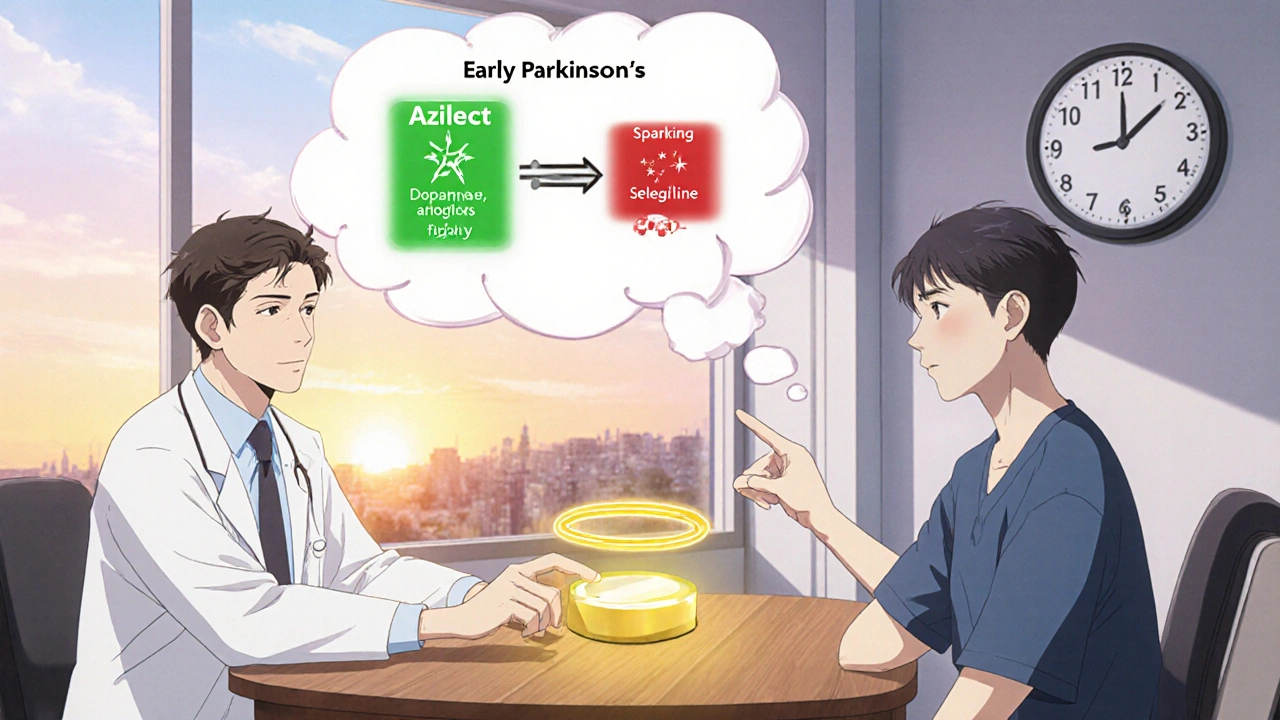Parkinson's Medication Advisor
Find Your Best Treatment Match
Answer these questions to see how Azilect compares to other Parkinson's medications for your specific situation.
How This Tool Works
Based on your answers, we compare Azilect (rasagiline) against other Parkinson's medications like:
- Levodopa (Sinemet)
- Pramipexole (Mirapex)
- Ropinirole (Requip)
- Selegiline
- Entacapone (Comtan)
Your Personalized Recommendation
When you’re managing Parkinson’s disease, finding the right medication isn’t just about reducing tremors-it’s about keeping your daily life steady. Azilect (rasagiline) is one of the options doctors prescribe, especially in early stages. But it’s not the only one. How does it stack up against other drugs like levodopa, pramipexole, or selegiline? And more importantly, which one might work better for you?
What Azilect (Rasagiline) Actually Does
Azilect is a brand name for rasagiline, a type of drug called an MAO-B inhibitor. It works by blocking an enzyme in the brain called monoamine oxidase B, which breaks down dopamine. Less breakdown means more dopamine stays around to help with movement control. That’s the core issue in Parkinson’s: your brain stops making enough dopamine.
Unlike levodopa, which replaces dopamine directly, Azilect doesn’t add more-it helps preserve what’s already there. That’s why it’s often used early on, either alone or with other meds. Studies show it can slow symptom progression slightly in early Parkinson’s, though the effect is modest. The standard dose is 1 mg per day, taken in the morning. It’s generally well-tolerated, but not everyone reacts the same way.
How Azilect Compares to Selegiline
Selegiline is another MAO-B inhibitor, and it’s been around longer than Azilect. Both drugs work similarly, but there are key differences.
Selegiline comes in oral tablets, disintegrating tablets, and even a patch. Azilect is only available as a tablet. Selegiline breaks down into amphetamine-like byproducts, which can cause jitteriness, insomnia, or even hallucinations in some people. Azilect doesn’t produce those metabolites, so it’s often preferred for older patients or those sensitive to stimulant effects.
One 2012 study comparing the two found that rasagiline had fewer side effects related to the central nervous system. Patients on selegiline reported more dizziness and sleep issues. If you’ve tried selegiline and felt wired or had trouble sleeping, Azilect might be a smoother alternative.
Levodopa: The Gold Standard, But Not Always First
Levodopa (often combined with carbidopa as Sinemet) is still the most effective drug for controlling Parkinson’s symptoms. It directly turns into dopamine in the brain. If your tremors are getting worse, or you’re struggling to walk or get out of bed, levodopa will likely give you the biggest lift.
But it has downsides. Long-term use can lead to dyskinesias-uncontrolled, jerky movements. It also wears off faster over time, leading to "on-off" fluctuations where you suddenly switch between mobility and stiffness.
Azilect doesn’t replace levodopa. It’s often added to it to smooth out those fluctuations. In fact, combining Azilect with levodopa can reduce the daily dose of levodopa needed by 10-20%, which may delay the onset of dyskinesias. If you’re on levodopa and still having bad days, adding Azilect could help.
Pramipexole and Ropinirole: Dopamine Agonists
Pramipexole (Mirapex) and ropinirole (Requip) are dopamine agonists. Instead of boosting dopamine levels, they mimic dopamine by binding directly to its receptors. They’re often used in early Parkinson’s, especially for younger patients.
Compared to Azilect, dopamine agonists tend to work faster and more noticeably. But they come with a heavier side effect profile: nausea, dizziness, swelling in the legs, and-critically-impulse control disorders. People on these drugs have reported compulsive gambling, shopping, eating, or hypersexuality. These aren’t rare; studies show up to 17% of users develop them.
Azilect doesn’t carry that risk. If you’re concerned about behavioral changes, or you’ve had a history of addiction or mental health issues, Azilect is a safer bet. It’s less flashy than pramipexole, but it’s quieter and steadier.
Entacapone and Tolcapone: COMT Inhibitors
These drugs-entacapone (Comtan) and tolcapone (Tasmar)-work differently. They block an enzyme called COMT, which breaks down levodopa before it reaches the brain. That means more levodopa gets through, making it last longer.
They’re almost always used alongside levodopa, not alone. Tolcapone has a rare but serious risk of liver damage, so it requires monthly blood tests. Entacapone is safer but needs to be taken with every levodopa dose, which can get messy.
Azilect doesn’t interfere with levodopa absorption. It works in the background, helping preserve dopamine without needing to time doses around your levodopa. If you’re already juggling multiple pills, Azilect’s once-daily simplicity is a relief.
Other Options: Amantadine, Safinamide, and Newer Treatments
Amantadine is an old drug originally used for the flu. It helps with dyskinesias and can be used alone in early Parkinson’s. It’s cheap and often well-tolerated, but its effect fades over time.
Safinamide (Xadago) is another MAO-B inhibitor, similar to Azilect, but it also blocks glutamate, a brain chemical involved in movement control. It’s approved as an add-on to levodopa for mid-to-late stage Parkinson’s. It’s more expensive and not usually a first choice.
Newer treatments like Duodopa (a gel pump delivered to the small intestine) or deep brain stimulation (DBS) are for advanced cases. Azilect doesn’t replace these, but it can help delay when they’re needed.
Who Benefits Most from Azilect?
Not everyone needs Azilect. It’s not a miracle drug. But it fits well in specific situations:
- You’re in the early stages and want to delay starting levodopa
- You’re already on levodopa but having "off" periods
- You’re sensitive to stimulant side effects (like from selegiline)
- You’re worried about impulse control issues from dopamine agonists
- You want a simple, once-daily pill with minimal interactions
It’s not ideal if you have severe liver problems-Azilect is processed by the liver. Or if you’re taking certain antidepressants like SSRIs or SNRIs, there’s a small risk of serotonin syndrome. Always check with your doctor before mixing meds.

Cost, Availability, and Real-World Experience
Azilect is a brand-name drug. Generic rasagiline is available in Australia and the U.S., which cuts the cost significantly. In Australia, a 30-day supply of generic rasagiline 1 mg costs around $25-$40 with a PBS subsidy. Without subsidy, it’s over $150.
Compared to pramipexole or ropinirole, which also have generics, Azilect isn’t the cheapest-but it’s often cheaper than newer options like safinamide, which can cost over $500 a month.
Patients who switch from selegiline to Azilect often report feeling calmer, sleeping better, and having fewer mood swings. Those who add it to levodopa say they notice fewer "crashes" in the afternoon. But if you’re expecting dramatic improvement, you might be disappointed. Azilect’s strength is in consistency, not fireworks.
What to Watch Out For
Side effects of Azilect are usually mild: headache, joint pain, indigestion, or dizziness. But there are red flags:
- High blood pressure (especially if you’re also taking decongestants or certain antidepressants)
- Sudden confusion or hallucinations (rare, but possible)
- Severe drowsiness or falling asleep unexpectedly (reported in less than 2% of users)
Don’t drink red wine or eat aged cheeses while on Azilect-unlike older MAO inhibitors, it doesn’t require a strict diet. But if you’re on high doses or have liver issues, moderation is still wise.
Final Thoughts: Choosing Your Path
There’s no single best drug for Parkinson’s. What works for one person might not work for another. Azilect isn’t the most powerful, but it’s one of the safest and simplest. If you’re looking for steady, low-risk symptom control-especially in early Parkinson’s-it’s a solid choice.
If your symptoms are worsening quickly, levodopa will likely be your next step. If you’re young and want strong early control, dopamine agonists might be tempting-but weigh the behavioral risks. If you’ve had bad reactions to selegiline, Azilect is your cleaner alternative.
The goal isn’t to find the "best" drug. It’s to find the one that lets you live your life with the fewest side effects and the most consistency. For many, that’s Azilect.
Is Azilect better than levodopa for early Parkinson’s?
Azilect isn’t better than levodopa-it’s different. Levodopa is the most effective at controlling symptoms, but it can cause long-term side effects like dyskinesias. Azilect is milder and helps preserve dopamine, making it a good choice for early-stage patients who want to delay starting levodopa. Many doctors use Azilect first, then add levodopa later when symptoms progress.
Can I take Azilect with antidepressants?
It depends. Azilect can interact with certain antidepressants like SSRIs (e.g., sertraline) or SNRIs (e.g., venlafaxine), increasing the risk of serotonin syndrome-a rare but serious condition. If you’re on these meds, your doctor may choose a different MAO-B inhibitor or adjust your doses carefully. Never combine them without medical supervision.
Does Azilect cause weight gain or loss?
Azilect itself doesn’t directly cause weight changes. But because it improves movement and energy levels, some people eat more or become more active, leading to weight loss or gain indirectly. Others report reduced appetite due to mild nausea. Weight changes are uncommon and usually minor.
How long does it take for Azilect to start working?
Most people notice subtle improvements in movement and energy within 2 to 4 weeks. Unlike levodopa, which works in minutes, Azilect builds up slowly. It’s designed for long-term use, not quick fixes. Don’t expect dramatic changes right away.
Is generic rasagiline as good as Azilect?
Yes. Generic rasagiline contains the exact same active ingredient as Azilect and is required by regulators to meet the same standards for absorption and effectiveness. Many patients switch without noticing any difference. The only differences are in inactive ingredients (fillers, coatings), which rarely affect how the drug works.


Azilect saved my dad’s quality of life. He was on selegiline and felt like a jittery coffee addict. Switched to rasagiline-calm, slept through the night, no weird cravings. No fireworks, but he can finally tie his shoes without help. 🙌